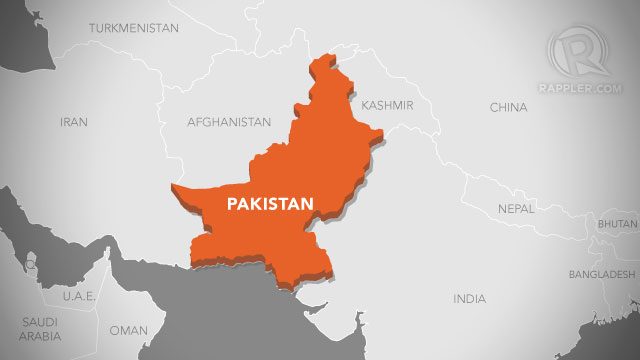SUMMARY
This is AI generated summarization, which may have errors. For context, always refer to the full article.

ISLAMABAD, Pakistan (UPDATED) – A bomb tore through a bustling fruit and vegetable market in the Pakistani capital Islamabad Wednesday, April 9, killing at least 22 people in the latest violence to hit government peace talks with the Taliban.
The blast took place around 8:00 am (0300 GMT) at the wholesale market near the capital’s twin city Rawalpindi, as hundreds of grocers and sellers gathered to trade.
The bombing – the deadliest to hit Islamabad since a huge truck bomb at the Marriott Hotel in 2008 – left a 1.5-meter diameter crater and littered the site with body parts and guava fruit drenched in blood, an AFP reporter at the scene said.
The attack comes as the government tries to negotiate an end to the Tehreek-e-Taliban Pakistan’s (TTP) seven-year campaign of violence.
Talks began between government and TTP intermediaries in February.
The Taliban said it was not to blame for Wednesday’s attack and has also denied some earlier bombings.
But whoever was responsible, more than 160 people have been killed in attacks since the start of the peace process, leading many to question its worth.
It is also unclear whether the umbrella Taliban group can control all its factions.
Javaid Qazi, the vice-chancellor of the Pakistan Institute of Medical Sciences hospital, said 22 people had been killed and 96 wounded in the blast.
The TTP’s main spokesman Shahidullah Shahid said the group had nothing to do with the attack and urged the government to find those responsible.
‘Bodies flying everywhere’
Eyewitness Muhammad Tahir described the bloody carnage as the bomb detonated.
“The blast took place around 8:00, when we were standing there – bodies were flying everywhere, bodies were flying at the height of 20 to 25 feet,” he told AFP.
Ambulances were rushing in and out carrying wounded people and bodies.
Senior local administration official Nauman Yousuf told AFP “it was a planted bomb.”
A bomb disposal official told AFP on condition of anonymity that the device hidden in a fruit box weighed five to six kilograms (11 to 13 pounds) and was packed with nuts and bolts to cause maximum carnage.
Thousands have been killed in militant violence since the TTP rose up against the Pakistani state in 2007. But attacks on the capital, much of which is heavily guarded, have been rare in recent years.
Wednesday’s blast came a little over a month after a gun and suicide bomb attack on a court complex in Islamabad killed 11 people including a judge.
The TTP also denied that attack, which was claimed by the Ahrar-ul-Hind splinter group which rejects the peace process.
Fighting has erupted in northwest Pakistan between rival TTP factions since Sunday, and nine more people including two civilians were killed on Wednesday.
The clashes pitting supporters of Khan Said Sajna against followers of the late Hakimullah Mehsud, the TTP commander killed by a US drone in November, have killed a total of 43 people in four days.
The government has freed more than 30 Taliban prisoners in the past week to try to spur talks with the militants, and on Friday the TTP said they would extend a ceasefire begun on March 1.
On March 26 a four-member government committee held its first direct meeting with members of the TTP’s political council in North Waziristan tribal district.
There have been suggestions that high-profile figures held by the militants, including the son of former prime minister Yousuf Raza Gilani, could be freed in return.
The peace talks were a key campaign pledge by Prime Minister Nawaz Sharif before he was elected to office for a third time last year.
But some analysts have voiced scepticism about their chances for success, given the Taliban’s demands for nationwide sharia law and a withdrawal of troops from the lawless tribal zones.
Regional deals struck in the past between the military and the Taliban have failed and some have accused the militants of using them as a means to regroup and rearm. – Rappler.com
Add a comment
How does this make you feel?
There are no comments yet. Add your comment to start the conversation.